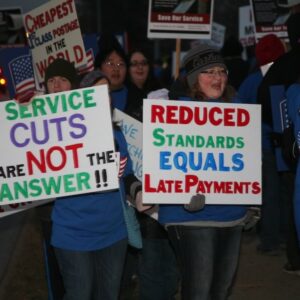May 2, 2005
Union Wins Another ‘Sunday-Premium’ Case
In a significant win for the union, an arbitrator has ruled that the Postal Service must grant Sunday premium pay to employees who work on Sunday, even if the work is the result of an employee’s request for a temporary change of schedule for the employee’s personal convenience.
“We have fought long and hard to protect Sunday premium pay for our members who perform work on Sundays,” said APWU Industrial Relations Director Greg Bell. “This important victory clearly vindicates our consistent position on such pay issues and rejects another attempt by the Postal Service to deprive postal employees of Sunday premium pay.”
Previously, in a March 2004 pre-arbitration settlement, the union succeeded in overturning a Postal Service attempt to eliminate the payment of Sunday premium to employees in a continuation of pay (COP) status, or on court or military leave.
The most recent case arose after the Minneapolis Area Local filed a grievance over a manager’s posting that stated that premium pay would not apply if work performed on Sunday was “due to a temporary schedule change at the employee’s request.”
To justify the decision, the manager cited Section 434.31(c) of the ELM (Employee & Labor Relations Manual) — a provision first included in ELM Issue 11 (Oct. 7, 1988), but deleted from ELM Issue 13 as a result of a 1992 pre-arbitration settlement.
When the Postal Service sporadically continued to allow the practice, a Step 4 dispute was initiated. At Step 4, the Postal Service asserted that the language change regarding Sunday premium “was made as a matter of clarification, and was not intended to change existing policy.” The Postal Service’s agreement to delete such language did not “concede any change in its interpretation of the section,” management said.
The APWU argued that any employee requesting a temporary schedule change for personal convenience must complete a Form 3189, which waives only out-of-schedule premium pay — not Sunday premium pay. Moreover, if the Postal Service enjoys the fruits of its employees’ Sunday labor, the APWU argued, there is no equitable explanation why it should not pay them Sunday premium.
The APWU also asserted that Article 8.6 of the Collective Bargaining Agreement does not allow exceptions when employees work as a result of Postal Service approval of their request for a change of schedule.
The union has consistently contended that Article 8.6 entitles an employee to Sunday premium if two circumstances exist: (1) management schedules the employee to work; (2) the employee actually works on a Sunday.
In his ruling, Arbitrator Shyam Das relied on ELM Section 434.32 and Section 242.21 of the F-21 Handbook, writing that the absence of any specific language exempting employees who request a temporary schedule from Sunday premium pay — prior to the disputed issuance of ELM 11 in 1988 — was “striking.”
(More information on this case is available on the union’s Web site at www.apwu.org/dept/
ind-rel/index.htm and in the July/August issue of The American Postal Worker magazine.)
Leadership Training for Local Presidents
Designed to supply union officers with the knowledge and skills needed to guide an effective local, the APWU for the first time is presenting conferences on “Leadership Training for APWU Presidents.”
“We’re trying to take a new direction in the training of APWU’s top local officers,” said APWU President William Burrus. “We believe this program offers the best means to help meet the challenges and upcoming struggles.”
Training will be offered twice this year in weeklong sessions in Detroit. The first is scheduled for July 17-24 (the conference and hotel registration deadline is June 10). Class size is limited and participation is restricted to local and state presidents.
Offered by the APWU Research & Education Department in partnership with Wayne State University, the conferences will include seminars on such topics as “Leading Volunteers/Mobilizing Members” and “Communicating Effectively With the Members and Management.”
For further information and registration forms, visit the Research & Education pages at www.apwu.org.


